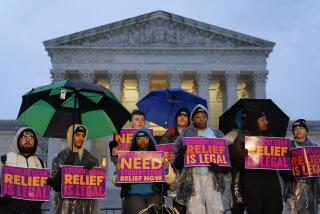The Pledge Gibberish
- Share via
Gov. Michael S. Dukakis vetoed a bill nine years ago that called for punishing public school teachers who did not start every day of class with a pledge of allegiance to the American flag. A lawyer, he saw it as a legal matter and decided that no matter how much the pledge might comfort patriots, the U.S. Supreme Court had ruled in 1943 that laws designed to force its recital were unconstitutional.
Vice President George Bush was taught to fly, not adjudicate, so he sees the veto not as a legal matter but as a case of undernourished patriotism. He attacked Dukakis for the veto, saying that he would have signed the bill. Dukakis counter-attacked, saying that the White House is no place for people willing to help make bad law.
By last week the Founding Fathers had been dragged, in retroactive shock, into the pledge argument, which passes in this campaign for debate, and the 1988 presidential race continued to lurch along its looping detour around issues that will determine how America gets through the next several decades.
The Bush discovery of what one of his top aides described, without discernable shame, as a really good issue might be dismissed as a harmless lapse into gibberish except that it is so undeniably a way for one candidate to claim that he is more loyal to America than the other, without having to say that in so many words. It is also the case that every hour of research and speech-writing on the Pledge of Allegiance is an hour pilfered from the $2-trillion national debt, the question of whether either candidate has the vaguest idea of how to deal with the coming massive changes in Eastern Europe, and the serious question of how much defense is enough.
The history of the pledge is crucial to any discussion of its place in the 1988 campaign for the presidency. Bush’s speeches notwithstanding, the founders never dealt with the issue, being long gone when it first appeared in an 1892 issue of a magazine, The Youth’s Companion, in response to a White House search for ways to help celebrate the 400th anniversary of the discovery of America. The pledge survived without any particular legal standing until 1942, when Congress federalized it by amending it into a law outlining the uses and abuses of the American flag. A year later, in the middle of World War II, the Supreme Court held that West Virginia was violating the constitutional rights of children by expelling them from school for refusing to pledge allegiance to the flag.
The turn away from serious issues in this campaign is disturbing. It becomes positively menacing when recent rhetoric on the Pledge of Allegiance is measured against Justice Robert Jackson’s eloquent call to reject compulsion in matters of patriotism. The argument would be compelling in any circumstance. It merits the closest attention now because it was written notin a geopolitical vacuum but at a time of both intense patriotism and real danger to the nation. What Jackson said was that children cannot be kicked out of school because they share the belief of Jehovah’s Witnesses that it is wrong to swear fealty to any symbol, secular or biblical, wartime or not.
“The issue here is whether this slow and easily neglected route to aroused loyalties (the study of America’s history) constitutionally may be short-cut by substituting a compulsory salute and a slogan,” Jackson wrote for the majority. Would government be stronger, as West Virginia argued that it would, if the court held that government had a right to expel children for refusing to recite the pledge? “Such oversimplification, so handy in political debate, often lacks the precision necessary to postulates of judicial reasoning,” he concluded.
“If there is any fixed star in our constitutional constellation,” Jackson concluded, “it is that no official, high or petty, can prescribe what shall be orthodox in politics, nationalism, religion or other matters of opinion.”
The best speech writers that money can buy are helpless against such impeccable logic. Presidents take an oath not to protect the Pledge of Allegiance but to “preserve, protect and defend” the Constitution. The sooner that this year’s candidates acknowledge that important difference,the sooner that the campaign can address the real issues. If they fail to turn that corner, they can put the United States in jeopardy in ways that lie well beyond the reach of the most fervent recitation of the Pledge of Allegiance.
More to Read
Get the L.A. Times Politics newsletter
Deeply reported insights into legislation, politics and policy from Sacramento, Washington and beyond. In your inbox twice per week.
You may occasionally receive promotional content from the Los Angeles Times.









